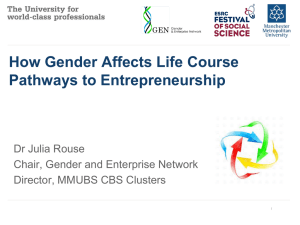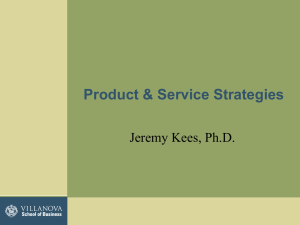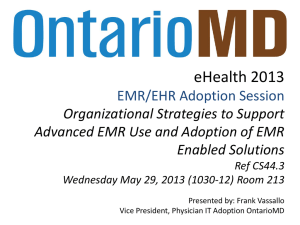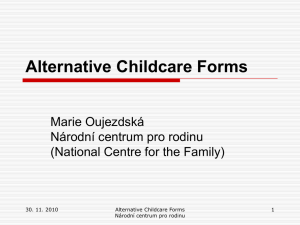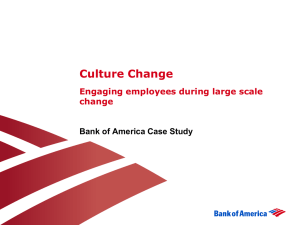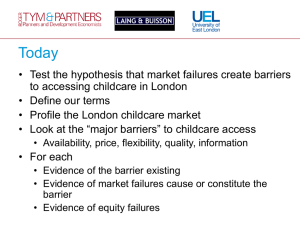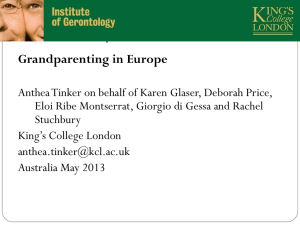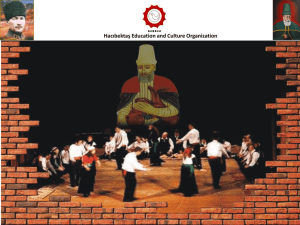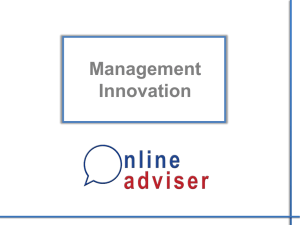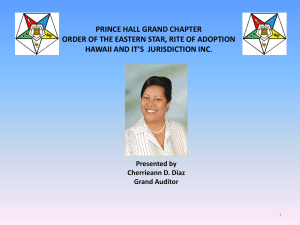Childcare - Kind en Gezin
advertisement
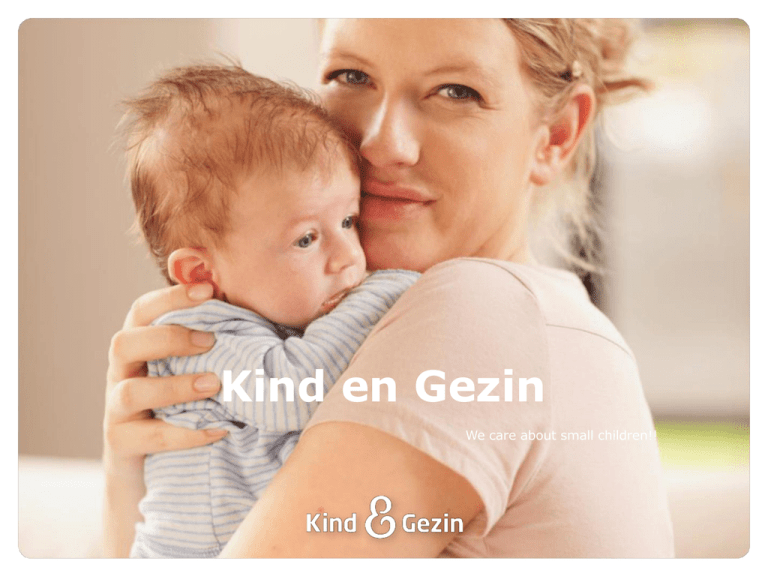
Kind en Gezin We care about small children!! 1. About Kind en Gezin 1. Mission and Values 2. Our assignment 3. Organisation 4. History 1.1 Mission and values Kind en Gezin, along with its partners, is committed to creating a maximum of opportunities for every child, wherever and however it was born and raised. 1.1 Mission and values • Attention for: Diversity Children’s rights • Kind en Gezin staff are committed to being: 1.2 Assignment Contributing to the well-being of young children and their families in an active way Through 3 policy areas: • Preventive family support • Childcare • Adoption 1.2 Assignment • Preventive family support Free guidance for parents (to be) from pregnancy until the child is 3 • Childcare No organiser but general director of childcare (Flanders and Brussels) • Adoption Information to and guidance of adoptive and birth parents 1.3 Organisation Kind en Gezin: Internally autonomous agency with legal responsibility 1.3 Organisation • Central divisions Coordinating services: management and development, internal support • Provincial divisions Implementation of the services provision 1.3 Organisation Complaints dept Kind en Gezin contact centre Internal and external communication 1.3 Organisation Covering the 3 policy areas • Kind en Gezin – Contact centre Questions and counselling (3 policy areas) Making/changing appointments for house calls, consultations • Complaints department Complaints about the Kind en Gezin services provision Complaints about institutions or individuals employed within the Kind en Gezin sector 1.3 Organisation • Internal and external communication External communication addressed at parents and partners - One-to-one consultations - Website (per theme/stage in infancy) - Newsletters on pregnancy, the evolution from baby to toddler, childcare, adoption and family support (per age/ad hoc) - Brochures, leaflets, posters, accounts, annual reports - Video material - Social media - Campaigns - Information evenings and fairs (pregnant women) , starters markets (childcare) 1.3 Organisation - Training sessions and refresher courses (childcare) - Online learning modules (professionals) External communication for doctors - Extranet 1.3 Organisation Internal communication - Intranet, news items - De Schakel (staff magazine) - Website - Online learning modules - Accounts, annual reports, in-depth information - Training sessions and refresher courses 1.3 Organisation Advisory committee Advisory committee on adoption 1.3 Organisation • Advisory committee Issues advice (request by the Administrator General – own initiative) Touchstone of policy implementation • Advisory committee to the Flemish Centre for Adoption Issues advice to this organisation 1.4 History • 1904: Start organised child care First efforts by volunteers • 1919: National Work for Child Welfare (NWK) Organised at national level • 1984: Kind en Gezin Organised at Flemish-Community level • 1987: Kind en Gezin as a Flemish public institution (VOI) • 2006: Kind en Gezin as an internally autonomous agency with legal personality 2. Preventive Family support 1. Assignment 2. Target group 3. Prenatal services provision 4. Postnatal services provision 5. Partners 6. Innovation: Huizen van het Kind (one-stop shops) 2.1 Assignment Kind en Gezin guides parents (to be) from pregnancy until the child is 3. • Characteristics of the services Preventive On a voluntary basis Free of charge Demand-driven customised care Supportive of a positive attitude Acknowledging parents’ possibilities Reaching out to socially vulnerable groups 2.1 Assignment • Key themes Healthy food and exercise Body care and hygiene Health and full set of vaccinations Safe living and sleeping environments Optimal development Positive parenthood 2.1 Assignment • Organised in district teams District team managers District nurses Family support workers Supported by provincial consultants, lactation specialists and provincial consulting physicians In infant welfare clinics too: physicians and volunteers Districts in Antwerp Districts in Limburg Districts in East Flanders Districts in West Flanders Districts in Flemish Brabant and Brussels 2.2 Target group • Parents to be (prenatal services provision) • Families with children aged 0-3 (postnatal services provision) 2.3 Prenatal services provision • Info evenings and maternity fairs in cooperation with maternity clinics • Information Pregnancy booklet Brochures Kind in Beeld: information conveyed through pictures and pictographs Website Kind en Gezin – contact centre Newsletters on pregnancy Social media 2.3 Prenatal services provision • Guidance of (socially) vulnerable pregnant women E.g. teenage pregnancies, addiction, financial problems, individuals without identity papers, disabled individuals, … • Prenatal support centres in some of the bigger towns Prenatal consultations and house calls Referral to mainstream services provision Smaller towns and municipalites: house calls by the district nurse 2.4 Postnatal services provision • Introductory visit (in maternity clinic or at home) • House calls • Hearing test • Provision of services on education (incl. Consultation on Education Support) 2.4 Postnatal services provision • Consultations at infant welfare clinic Weighing and measuring (volunteers) Preventive medical examination by a physician Vaccinations Eye test at 12 and 24 months Discussion of questions 2.4 Postnatal services provision • Information Child booklet Brochures Kind in Beeld: information conveyed through pictures and pictographs Website Kind en Gezin – contact centre Newsletters ‘Van baby tot kleuter’ (from baby to toddler) Social media 2.5 Partners • Partners registered and subsidised by Kind en Gezin Authorities organising infant welfare clinics and prenatal support centres 'Inloopteams‘ (supplying educational support to deprived families) Childcare and family support centres Education shops Maternity care expertise centres Confidential centers on child abuse and neglect 2.5 Partners ‘EXPOO' (expertise centre on education support) 'Opvoedingslijn' (contact centre for eductional issues) Initiatives geared at enhancing play and encounter Local projects - E.g. Domo volunteers (helping with education through support) - E.g. Enhancing schooling opportunities 2.5 Partners • Other partners Maternity clinics Gynaecologists Self-employed midwives Maternity and family care services Paediatricians and GPs Centres for General Welfare Women’s shelters Centres for Overall Family Care 2.6 Innovation: Huizen van het Kind Partnership • Kind en Gezin • Local organisations committed to assisting (future) families and young people 2.6 Innovation: Huizen van het Kind Open to all parents (to be) One-stop shop for education and growing-up Preventive health care, education support and promotion of encounter and social cohesion as a minimum services offer Local offer geared to local needs and harnessing local opportunities 3. Child care 1. Assignment 2. Types of child care 3. Functions of formal child care 4. Central and local policy 5. Monitoring and inspection 6. Subsidies for child care 7. 1 April 2014: new parliament act on child care 3.1 Assignment Contributing to the well-being of young children and their families in an active way through high-quality childcare Preparing the Flemish policy on childcare Implementing legislation Supporting parents and childcare In Flanders and Brussels 3.2 Types of childcare Kind en Gezin oversees: • Formal childcare for babies and toddlers Informal childcare – formal childcare - Informal: voluntary childcare taken up by grandparents, relatives, neighbours,… - Formal: regulated, organised childcare Home-based childcare – centre-based childcare - Home-based childcare: max. 8 children - Centre-based childcare: starting from 9 children 3.2 Types of childcare Fee: related to income – ad hoc • - Fee related to income: parents pay according to income - Ad hoc: fixed fee, fixed by the childcare provider After-school childcare Initiatives for after-school childcare Self-employed after-school childcare 3.2 Types of childcare • Childcare provision likely to be extended Inclusive childcare (for children with specific care needs) Flexible childcare (early in the morning, late in the evening, during the week-end, …) 3.3 Functions of formal childcare • Economic function Parents can take a job and earn an income Child care = job opportunities for lots of people • Social function As a means of combatting the exclusion of disadvantaged groups (both children and parents) As a means of promoting integration 3.3 Functions of formal childcare • Pedagogical function Provides care and security Enhances children’s physical and psychological development Is a space for interaction with other children Teaches how to interact respectfully with other children 3.4 Central and local policy • Kind en Gezin = Central director • Local authority (municipality and OCMW): responsible for local childcare policy • 3 instruments Local Childcare Policy Plan Local Childcare Consultation - Municipality can organise its own childcare Local Childcare Desk - Supports parents in their search for childcare 3.5 Monitoring and inspection • Kind en Gezin doesn’t carry out ANY inspections • Inspections are effected by the Flemish Care Inspectorate, which draws up an inspection report with recommendations • Kind en Gezin makes decisions based on the report and recommendations of the Flemish Care Inspectorate 3.6 Subsidies for childcare Level 3 Level 2 Subsidy ‘plus’ – – Vulnerable families Priority rules Level 1 Base subsidy Individual special care zorg Subsidy on income-based fee Subsidy on income-based fee – – Fee based on income Priority rules Base subsidy Base subsidy – – Use of Dutch Open 220 days a year Individual and/or structural special care 4. Het Vlaams Centrum voor Adoptie (Flemish Centre for Adoption) 1. Assignment 2. Legislation 3. Domestic adoption 4. Intercountry adoption 4.1 Assignment Supervises all adoptions of minors, both domestic and intercountry adoptions 4.2 Legislation The Hague Convention (1993) and Belgian legislation • 2 major principles: Adoptability (free and fully informed consent) Subsidiarity (Intercountry adoption as a last resort: after adoption by own relatives and domestic adoption) 4.3 Domestic adoption Child resident in Belgium adopted by parents resident in Belgium • Unknown child (through adoption agency) Procedure: Information session and preparation for parents as required Social enquiry into prospective adoptive parents –guidance and support for birth parents – placement of child and after-care through adoption agency Adoption verdict pronounced in court 4.3 Domestic adoption • Known child (stepparent, co-mother, foster child) Procedure: Applications through VCA Preparation by ‘EVA-vorming' Adoption proceedings before the juvenile court Adoption verdict following a social enquiry, if required 4.4 Intercountry adoption Child resident abroad is adopted by parents resident in Belgium Procedure: Info session (Adoption Support Centre) or individual meeting with VCA (intra-family adoption) Preparation after management of candidate parents inflow (Adoption Support Centre) Social enquiry (3 accredited services) Suitability judgement by the juvenile court 4.4 Intercountry adoption Mediation by adoption service (3 accredited services) or independent adoption (via VCA) Accreditation by Federal Central Authority After-care (adoption services, Adoption Support Centre, meeting groups)

